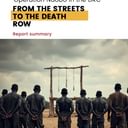Reuters
November 9, 2001
Former chief prosecutor for the U.N. war crimes tribunal Richard Goldstone said on Friday the perpetrators of the Sept. 11 attacks on America should be tried in an international court rather than on U.S. soil.
Goldstone, now a justice on South Africa’s Constitutional Court, said the attack on the World Trade Center and the Pentagon were crimes against humanity and should be prosecuted in an ad hoc international tribunal drawn up by the U.N. Security Council.
The main suspect for the Sept. 11 aerial attacks, in which nearly 5,000 people were killed, is Saudi-born dissident Osama bin Laden and members of his al Qaeda network, who are being tracked down by U.S. investigators worldwide.
Pointing out the practical advantages of an international court for the case, Goldstone said a large number of suspects were likely to be arrested abroad and many nations would not want to extradite them because of U.S. support for the death penalty.
“It would be so much easier to send those people to an international court set up by the Security Council,” said Goldstone, who was chief prosecutor for the U.N. war crimes tribunal for the former Yugoslavia and Rwanda.
In addition, he said many countries might be reluctant to extradite suspects to America for fear they would not get a fair trial in the United States.
“I don’t question it could be (fair), but I am talking about perceptions,” said Goldstone, speaking to reporters at the National Press Club in Washington.
Goldstone said the Hague in the Netherlands, where the U.N. war crimes tribunal for former Yugoslavia is based, would be an obvious venue for such a court and could be running in months.
LOCKERBIE-STYLE TRIAL AN OPTION
Another option was to have a Lockerbie-style trial, where those responsible for the 1988 bombing of a Pan Am flight over the Scottish town of Lockerbie were tried in another country, the etherlands, by a special Scottish court.
Using this model, a U.S. judge could hear the Sept. 11 case in a foreign country, possibly in a nation which did not oppose capital punishment, thus enabling America to impose the death penalty, said Goldstone.
He urged the United States to change its stance and support the 1998 Rome Treaty for an International Criminal Court (ICC), which has already been ratified by 43 countries. After the treaty has been approved by 60 nations, the court may begin to operate.
“After being the strongest supporter of the International Criminal Court, the United States did an about-turn, mainly because of the fears of the military and conservative members of Congress,” Goldstone said.
“It was the Pentagon that really changed the thinking of the Clinton administration, regrettably,” he said.
The Rome Treaty limits jurisdiction to accused from countries who have ratified it and to those who committed crimes on the soil of a country that agreed to the treaty.
Goldstone said he understood the fears of the military over an ICC, conceding it was unpleasant to have lawyers watching over them day and night and saying which targets were justified.
“It’s a nuisance, but it’s necessary because the law is important, especially during times of conflict when innocent people need to be protected, he said.
Goldstone said if the United States still opposed the ICC, an ad hoc court appointed by the United Nations (news — web sites) could come into play. Judges deemed inappropriate could be vetoed by the United States and the prosecutors appointed by the council.
“In order to avoid impunity and multiplicity of trials … it would make more sense to have one trial in an international court,” Goldstone said. He voiced concern over broader powers the United States has given to Sept. 11 investigators, including the right to search without warrants and the erosion of lawyer-client privilege.
“There is a danger when any nation faces this sort of peril to immediately look for more powers and my own fear and experience is that those powers almost inevitably affect the rights of everybody but the people intended to be put in peril,” he said.



